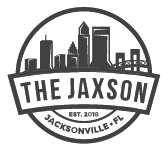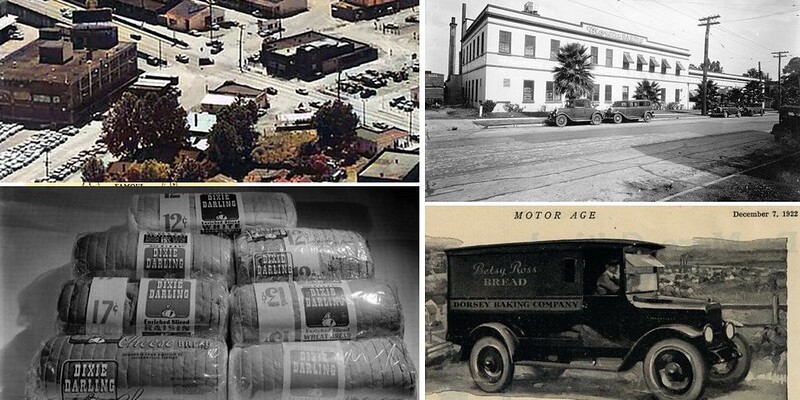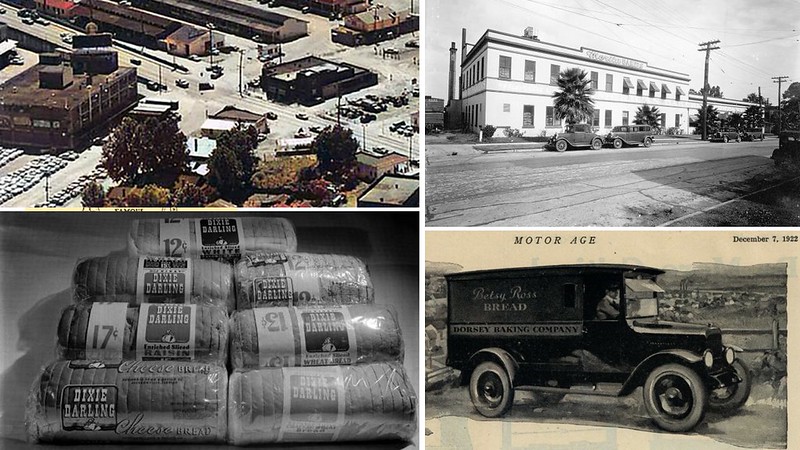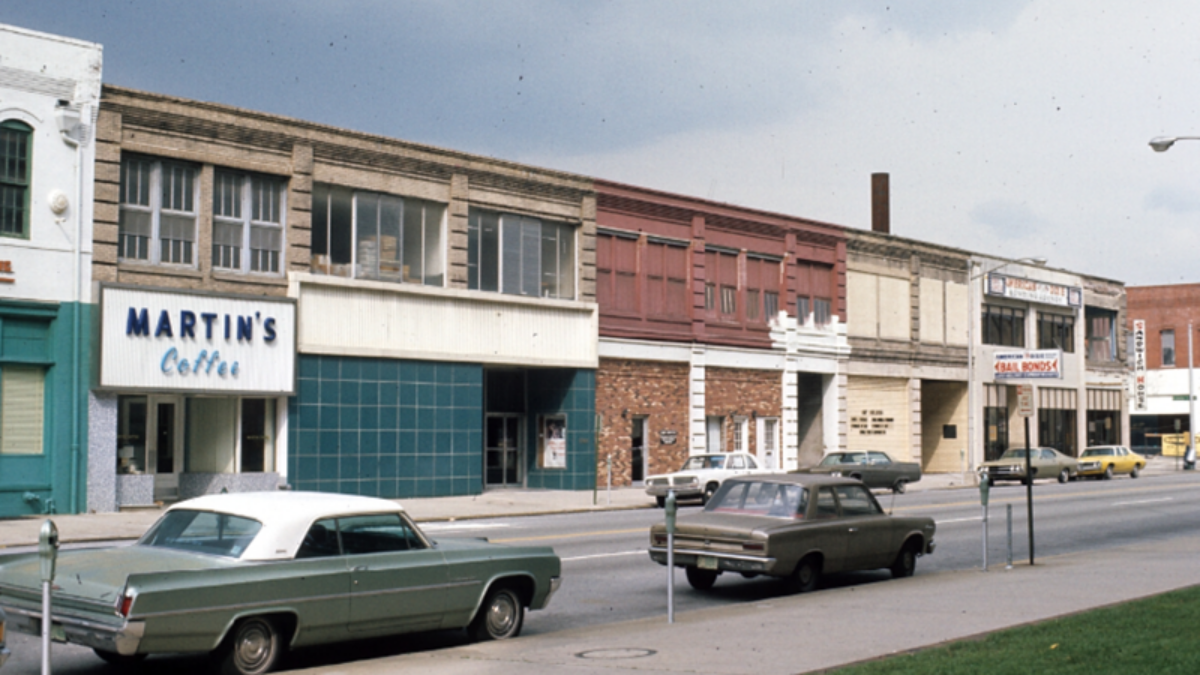
While Jacksonville has long been associated with the pungent odor of paper mills and the rich aroma of roasted coffee, much of the city was once defined by a different scent: the comforting smell of freshly baked bread. Due to its strategic location as Florida’s logistics center, the city was home to several wholesale bakeries that relied on specialized production techniques and expansive distribution networks to serve a wide range of commercial clients.
Here are the stories of Jacksonville’s largest and most influential early wholesale bakeries.
A&P Food Stores
1775 W. Beaver

Founded in New York City by George Gilman in 1859, The Great Atlantic & Pacific Tea Co., originally named Gilman & Co., was rebranded as A&P in 1869. By 1930, A&P had grown into the world’s largest retailer, generating $2.9 billion in annual sales and operating more than 16,000 stores. Until 1965, it held the distinction of being the largest retailer in the U.S., with a cultural presence as iconic in its era as Walmart, McDonald’s, or Google are today.
A&P’s Southeast headquarters was located in Jacksonville, where its regional operations included an industrial-scale bakery, a produce packing facility and a coffee roasting plant for its well-known Eight O’Clock Coffee brand.
Jacksonville was strategically selected for its logistical advantages: the ability to receive raw materials by rail and serve as a central distribution hub for truck delivery networks. Completed in 1932, A&P’s bakery was situated at the northeast corner of West Beaver Street and Robinson Avenue. The three-story structure was designed to be fireproof, constructed with reinforced concrete floors, brick infill curtain walls, and metal factory windows. An Atlantic Coast Line Railroad siding along the east side of the building ensured efficient shipment of bakery products.
A&P’s decline began after World War II, when the company struggled to adapt to evolving market competition and retail trends. In 1968, the company relocated most of its distribution operations to a new warehouse on Jacksonville’s Northside, at 3101 Hilton St., a site now occupied by Sysco Foods International.
Between 1972 and 1974, A&P closed nearly 800 stores. This reorganization also included closing the Jacksonville bakery. Despite a short-lived resurgence in the early 2000s, A&P ultimately ceased operations in 2015 after filing for Chapter 11 bankruptcy in both 2010 and 2015. In 2000, the former bakery site was demolished by Beaver Street Fisheries and redeveloped into a modern 30,255-square-foot freezer facility.
Ambrosia Cake Bakeries Corp.
1727-41 Danese

Constructed in 1925 for E.L. Green’s Sunshine Potato Chip Co., this rusticated concrete block building at 1727-41 Danese St. was among the first manufacturing operations established in the Glen Myra neighborhood of Jacksonville’s Historic Eastside. By 1928, the former potato chip facility on Danese Street had become home to the Ambrosia Cake Bakeries Corp. Originally founded in St. Louis by E.L. Bordo, the Ambrosia Cake Co. specialized in the manufacture of fresh cakes. After relocating the business to Jacksonville, it experienced rapid growth. Bordo sold the enterprise in 1925 and moved to Burlington, Vermont.
The buyer, Earle P. Colby of Holyoke, Massachusetts, had moved to Florida in 1924. At the time, Ambrosia operated from a small building at 2917 Main St. Colby’s business model focused exclusively on baking cakes and selling them wholesale to bakeries, which would then distribute them alongside bread to local merchants. Because Ambrosia’s cakes were highly perishable, lasting only about two days, they were priced between 5 cents and 39 cents and sold under various brand names.
As the company flourished, Colby became president of the Southern Bakers Association by 1950. With help from his brother, William C. Colby, Ambrosia expanded to include additional bakeries in Greensboro, North Carolina, and Birmingham, Alabama.
In 1954, the Kansas City-based Interstate Bakeries Corp. acquired Ambrosia, marking Interstate’s first foray into the Southern market. Organized as a separate cake division under the leadership of Earle P. Colby, the operation generated $1.5 million in annual sales and marketed cakes under the Ambrosia and Dolly Madison brands. Its distribution area stretched from Key West to Washington, D.C., and westward to Arkansas. Over time, Interstate Bakeries evolved into Hostess Brands, known for products like Twinkies, Wonder Bread, Nature’s Pride, and Dolly Madison. The continued corporate growth eventually led to the abandonment of the original Eastside bakery.
In 1956, brothers Clayton and Willard Smith repurposed the building for their bicycle business. Originally founded in Miami in 1944, Clayton-Willard Bicycles had relocated to Jacksonville in 1948. By 1976, the company began manufacturing the Emory bicycle at this location, becoming the first company in the U.S. to produce the iconic beach cruiser. Eventually, the business was rebranded as the Emory Manufacturing Co.
American Bakeries Co.
2135 Market St.

American Bakeries was established in 1910 through the merger of three companies: the Highland Baking Co., Martin Cracker and Candy Co. and the Huston Biscuit Co. In the early 1920s, American Bakeries constructed a Merita Bread bakery at the intersection of 11th and Market streets in Jacksonville’s Springfield Warehouse District. During the 1930s, a second Jacksonville location operated at 703-05 W. Bay St. in LaVilla.
In 1988, American Bakeries was acquired by IBC Holdings, which rebranded itself as Interstate Bakeries in 1991. To modernize its operations, Interstate Bakeries built a state-of-the-art, 141,833-square-foot bakery at 201 Bush Drive E. in the Imeson International Industrial Park in North Jacksonville. When it opened in 1994, the facility was capable of producing 168 loaves of bread per minute and was described as the best-equipped bakery within a 500-mile radius.
Most of the original Merita Bread bakery in Springfield was demolished in 1999. However, some of the remaining buildings were repurposed to serve as the Fleet Maintenance Department for the Jacksonville operation.
In 2009, Interstate Bakeries rebranded once again as Hostess Brands, Inc. However, just three years later, in 2012, Hostess was shut down and liquidated. At the time of closure, the North Jacksonville bakery employed 128 workers.
In January 2013, Flowers Foods announced its intent to acquire a number of Hostess’s bread brands. The initial offer, valued at $360 million, included 20 bakeries and 38 distribution depots, among them the North Jacksonville facility that had replaced the old Springfield plant. While Flowers did acquire the shuttered bakery, it ultimately chose not to reopen the location.
Dixie Darlings Bakery, Inc.
825 Barnett St.

A longtime brand under the Winn-Dixie banner, Dixie Darlings Bakery, Inc. operated for decades in Jacksonville’s New Town neighborhood. Located at 825 Barnett St., the wholesale bakery was housed within Winn-Dixie’s original corporate headquarters and distribution center.
Baking operations at the site began in 1931 under the Suwannee Food & Baking Co., which was affiliated with the Lovett’s Groceteria chain. Founded in 1928 by William “Bill” Lovett, the grocery business rapidly expanded, reaching 78 stores across Florida and Georgia. In 1939, Lovett persuaded Table Supply to acquire a controlling 51% stake in his company.
This strategic move led to the formation of Winn & Lovett, which became the new corporate name. In 1952, it made history as the first Florida-based industrial corporation to be listed on the New York Stock Exchange. The company’s distribution hub, which included the Dixie Darlings Bakery, became its official headquarters.
In 1955, Winn & Lovett merged with Dixie Home Stores of Greenville, South Carolina, which operated 117 stores. The newly combined company was renamed Winn-Dixie Stores, Inc., soon becoming one of the top 10 supermarket chains in the U.S.
While the grocery giant relocated its headquarters to West Jacksonville in the mid-1950s, the Dixie Darlings Bakery continued operating at its New Town location until the mid-1980s. In more recent years, the former industrial site was occupied by Load King. Today, the historic complex is listed for sale.
Flowers Baking Co.
825 Myrtle Ave.

The Flowers Baking Co. plant in the Grand Park neighborhood is likely Jacksonville’s oldest continuously operated wholesale bakery. Its origins trace back to 1936, when John Joseph Schopp, Jr. founded the Jax-Maid Baking Co. at 1185 Kings Road in Durkeeville. Located adjacent to the S-Line Rail Corridor, Jax-Maid was one of at least three major wholesale bakeries that once filled the neighborhood with the aroma of freshly baked bread during the early 20th century. A native of New York, Schopp, Jr. had previously served as the manager of the Ward Baking Co. in Springfield.
In 1948, Jax-Maid was acquired by the Flowers Baking Co.. Founded in 1919 by brothers William Howard and Joseph Hampton Flowers in Thomasville, Georgia, Flowers Baking began its expansion outside Thomasville with the acquisition of Tally Maid Bakery in Tallahassee in 1937.
After purchasing Jax-Maid, Flowers relocated its Jacksonville operation to a larger facility at 825 Myrtle Ave. during the 1950s. The company operated at this site until 1965, when it constructed its current 127,531-square-foot wholesale bakery at 2261 W. 30th St. Today, the only remnant of the earlier Durkeeville bakeries is a portion of the south exterior brick wall of the Myrtle Avenue plant.
In 2013, Flowers further expanded its reach by acquiring most of the bread brands from the former Hostess Brands, including Wonder Bread and 20 closed Hostess bakeries.
Now in its 89th year of operation, the Jacksonville bakery continues to produce a wide array of fresh and frozen baked goods, ranging from breads, buns, and rolls to snack cakes and pastries. With 2024 sales totaling $5.1 billion, Flowers is recognized as one of the nation’s leading producers of packaged bakery products.
Southern Baking Co. (Dorsey-O’Neil Bakery)
31 Warren St.

In 1914, the Dorsey-O’Neil Bakery established its wholesale facility near the intersection of Main and Warren streets. Later renamed the Dorsey Baking Co., the bakery underwent significant expansions during the 1920s. These included a redesign of the building into a Mediterranean Revival-style structure, a transformation led by Chicago architect Richard Griesser in 1922 and under the direction of New York architect J. Edwin Hopkins in 1925.
By 1926, the facility spanned an entire city block and had become the largest and most modern bakery in the Southern U.S. It boasted a daily output of 100,000 loaves of bread and cakes, including the Betsy Ross Bread brand. Advertisements from the time emphasized that Betsy Ross Bread was made with creamery butter and rich cream milk. The bakery’s fermentation room faced North Main Street, while its ovens were located on the eastern side of the plant, along North Hubbard Street.
That same year, the bakery was acquired by the Southern Baking Co. of New York City. Founded just two years earlier in 1924, Southern Baking was aggressively expanding across the Southeast and had recently purchased the O.A. Seybold Baking Co. of Miami. Known for its O Boy white bread brand, Seybold was such a recognizable name in Florida that by 1935, the Jacksonville bakery was renamed the Seybold Baking Co.
Southern Baking also built additional bakeries in Miami, Tampa and Daytona Beach in 1926. Collectively, these facilities produced more than 12 million loaves annually. During the Great Depression, the company was acquired by the Columbia Baking Co. of Atlanta. In 1958, it changed hands again, becoming part of Southern Bakeries, Inc.
The Jacksonville plant ceased operations in the early 1970s. It was later repurposed by the Duval Schools as a book depository. In the mid-1990s, the historic structure was integrated into the campus of the adjacent Springfield Middle School.
Ward Baking Co.
2401 Walnut St.

The Ward Baking Co. began as a small bakery in New York City in 1849. It was founded by James Ward and his son, Hugh Ward, who emigrated from Belfast, Ireland. By 1925, the company had grown into the largest commercial bakery in the U.S., distributing baked goods throughout much of the Eastern Seaboard and the Midwest.
Pioneering large-scale baking techniques, Ward Baking Co. was among the first to use mechanized production lines. Its Wonder Bread brand became one of the earliest factory-sliced breads in the country, revolutionizing the way bread was produced and consumed.
In 1926, the company expanded to Jacksonville, opening a new bakery at 2401 Walnut St. in the Springfield neighborhood. W.M. Lorenz served as the general manager of the plant. Just four years later, in Illinois, the company invented the now-iconic Twinkie snack cake.
During World War II, the Jacksonville facility played a vital role by supplying bread and rolls to nearby U.S. Navy installations. By 1965, the company’s local footprint included bakery thrift stores located at 2505 Liberty St., 1141 S. Edgewood Ave., and 2763 W. Beaver St.
Over the following decades, ownership of the company changed several times: it was acquired by ITT in 1968, sold to Ralston Purina in 1984, and then to Interstate Bakeries Corp. in 1995. In 2009, the business was ultimately rebranded as Hostess Brands.
The Jacksonville bakery ceased operations in the early 1980s. In the early 2000s, the historic plant was demolished, and the site was redeveloped into a parking lot for employees of the neighboring Swisher International cigar company headquarters.







